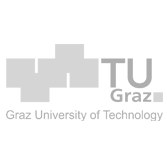Graz University of Technology, Institute of Inorganic Chemistry and Scattering Facilities in Graz and Italy

Partner location
Sites providing access
The TUG - Official website: www.tugraz.at - is the 2nd largest technical university in Austria, which focuses on five specific fields of expertise: Advanced Materials Science, Human & Biotechnology, Information Communication & Computing, Mobility & Production and Sustainable Systems (bold fields are related to proposal topics).
The Institute of Inorganic Chemistry is the participating research institute, which is dedicated towards fundamental and applied aspects of organometallic chemistry.
The scope of activities ranges from basic research of organo silicon, tin and phosphorus compounds, design of catalysts towards the applications of inorganic and organometallic oligomers, and polymers in the field of functional materials. The applications range from energy, semiconducters, optics and nanotechnology.
The participating work group has profound experience in the structural investigation of nano-biological materials (ranging from energy research till drug delivery systems) as well as on the microstructuring of materials by means of Deep X-ray lithography. Moreover, an intense activity of design and development of instrumentation and sample environment is carried out.
Besides providing access to the laboratory SAXS equipment with all its capabilities, it operates and provide access to the permanent outstation located directly at the synchrotron radiation facility Elettra (Small angle X-ray scattering and Deep X-ray Lithography beamlines). Here the full spectrum of the available sample environments (e.g. temperature, high pressure, rapid mixing, batch reactors) can be utilized in user experiments.
TUG role in NFFA-Europe:
TUG provides access to in Growth and Synthesis; Characterisation
TUG contributes to Joint Research on In-Operando and high throughput methods; High Precision Manufacturing; Time-resolved ultrafast probes on nanosystems
TUG leads Joint Research on In-Operando and high throughput methods

